The Secretariat of the IAMU undertook a survey on the impact of and response to COVID-19 by member universities. The specific objectives of the survey were to explore how the IAMU can support member universities and how shared experiences can benefit individual members and the association as a whole.
The survey question contents were about operational status of university, measures taken for university operation, measures taken with regard to teaching/learning activities, difficulties the university encountered with online/distance learning, measures taken regarding practical training, difficulties the university encountering with on-board training programme, main concern on university operation at present, main concern about long-term effect on university operation, influence of public policy to action taken and sources of information used in determining the institutional response. The survey was completed between 5th to 22nd May 2020 via web survey interface. Total 55 member universities from 35 countries took the survey, the response rate was 85%.
The summary result is available in PDF format

Country representation
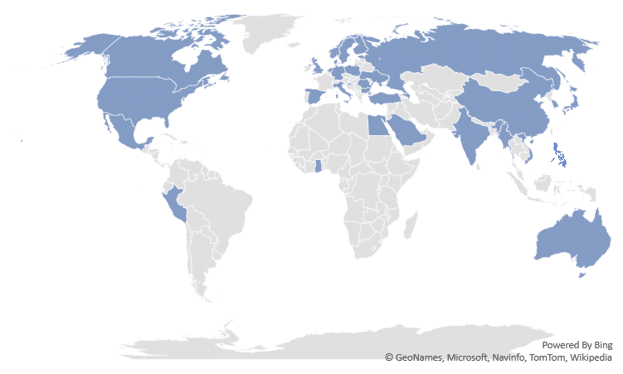
What is the current operational status of your university in relation to COVID-19?
84% of member universities are operating with limited activities
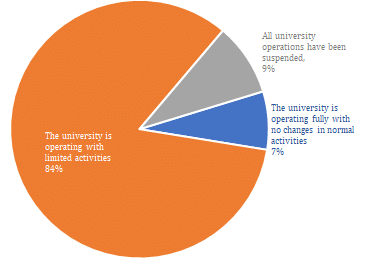
What measures have been taken with respect to the operation of the university in response to COVID-19?
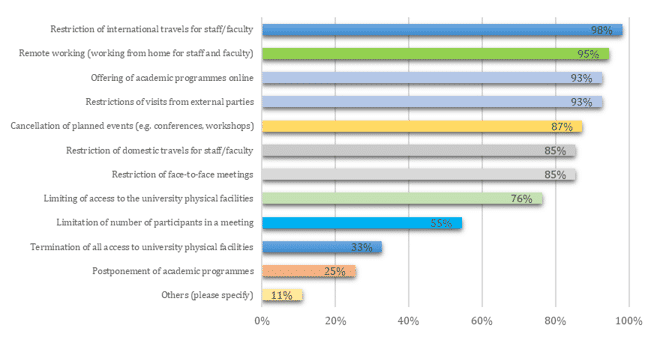
“Discussion sessions in the classroom were done in the morning only. Practical exercises, where applicable were done in the afternoon. All simulators/ laboratories operating. Learning Management System with 300 Seagull CBT titles, 110 Videotel modules and relevant Youtube downloads is open 24/7.”
“Seminars, workshops, meetings are being conducted online”
“Limiting access together with high level of health precaution, such as temperature checks and fumigation passages”
“Academic school year was shortened by 2 weeks, ending 30 April 2020, and only Virtual Graduation will be held soon”
What measures have been taken with regards to teaching and learning activities in response to COVID-19?
83% of member universities have shifted to full time online/distance learning
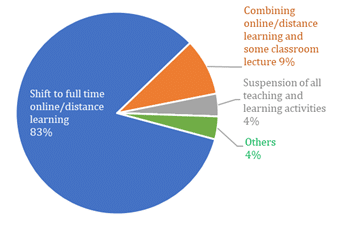
“Intending to shift to Flexible-Blended Learning, utilizing e-modules. Lecture coursework to be done mostly on-line. Performance-based coursework shall be interspersed with scheduled laboratory or practical sessions with limited number of attendees. Physical distancing and other anti-COVID protocols will be enforced”
Kindly indicate any difficulties the university has encountered with online/distance learning as a response to COVID-19. Difficulties with …
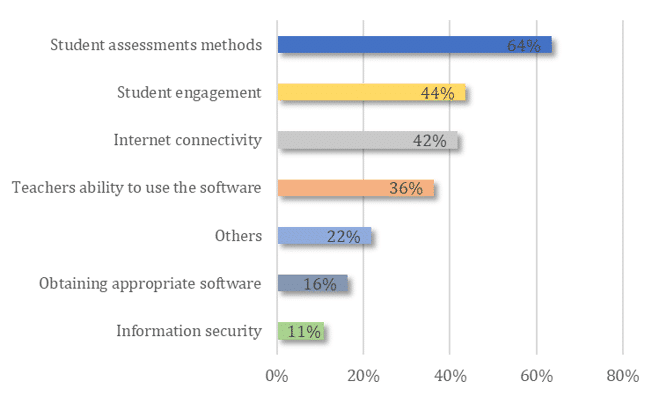
“Cost of connectivity is an added burden to the University, faculty & students. No appropriate LMS for maritime courses unless customized. Inadequate ability to use LMS/software both by student & faculty. Customized e-modules are still being prepared. Lack of faculty training for blended-learning approaches”
“Insufficient electricity supply”
“With relatively few online courses the volume of work required to move all teaching of conventionally taught courses online in a relatively short time is challenging”
“Capacity limitations of University LMS”
“Changing from campus-based teaching activities to online teaching activities has worked well. The challenge has been with the remaining simulator training and practical exercises”
“There has not been any major difficulties”
What measures have been taken regarding practical training sessions at your university?
69% of member universities have faced cancellation or postponement of the practical training at university
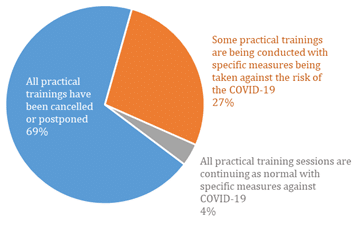
What specific difficulties are you encountering with on-board training programmes due to COVID-19?
40% of member universities have faced suspension or postponement of on-board training programmes
Difficulties in crew change and travel restrictions has affected on-board training execution
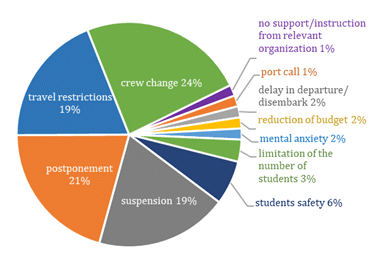
“For the sake of students’ safety, on-board practice has been put off till the situation is improved”
“Almost all companies have suspended on-board training”
“For the most part, on-board training programmes has been postponed because of difficulties in crew changes, restrictions of domestic and international travels, reduction of companies’ budget for maritime training, etc.”
“Restrictions on crew changes due to closure of frontiers and flights cancellations”
“Companies may not want to take interns for on-board training programmes due to pandemic and flight restrictions. Crew changes are not possible due to the pandemic. This may lead to students not starting their on-board training programmes”
“We have no problems with training being conducted aboard our two (2) training ships. We do have problems with those undergoing training on board the ships of their principals. There are numerous health requirements and international travel is very restricted. We hope this will ease up in the coming weeks”
What are the main concerns about the effects of the COVID-19 crisis on university operations at
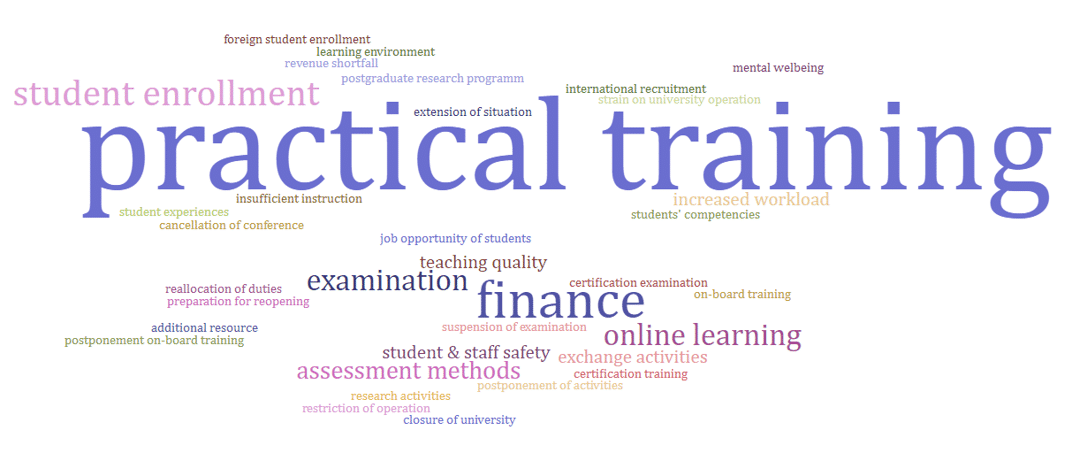
“The final components of these programs require on campus practical training. We are currently unable to get our senior students on campus to complete their required practical training to graduate from their programs and enter into the workforce”
“Our theoretical lectures have been completed efficiently. However, practical lectures such as first aid, safety at sea, fire fighting etc. are the main concern of our university. In this context, we are trying to improve our systems, simulators etc.”
“Recruitment from interstate for following semesters will be hampered by COVID-19 restrictions impacting the number of students applying to the university with associated revenue shortfall”
“We see some positive effects in the mindset and skills of both staff and students in web-based distance learning. Our long-term concerns are mainly the effects on possibilities of obtaining required sea time since right now we are postponing a lot and the positions and space on board are limited. The Shipping Industry may also suffer long term effects from the COVID-19 crisis resulting in a reduced ability to attract young people to a maritime career”
What are the main concerns about the long-term effects of the COVID-19 crisis on university operations?
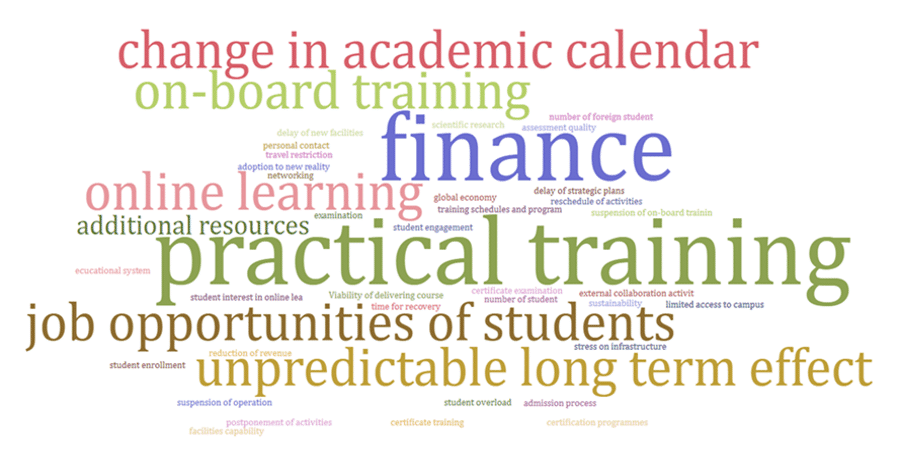
“Academic year extension will delay the students in getting their degrees and shipping companies are not able to visit the campuses and select students for placement. Online classes are conducted to teach theory parts only. Practical classes can be conducted only on campus which is not possible during the closure of the University and lock down period”
“Effects of reductions in student recruitment will have a major impact on revenue”
“The long-term effect will be caused by a financial crisis in the country which will affect the students’ capability to pay tuition fees. The university will have to switch to a new reality and new regulations which are still in the process of development by regulatory bodies”
“The challenge is in carrying out seagoing practice for deck officers, because many of the companies have terminated contracts with the students”
To what extent have the actions taken by the university been the result of public policy?
65% of member universities have taken actions based on university’s initiative and government requirements
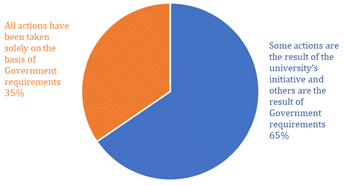
What are the sources of information your university has used in determining the institutional response to COVID-19?
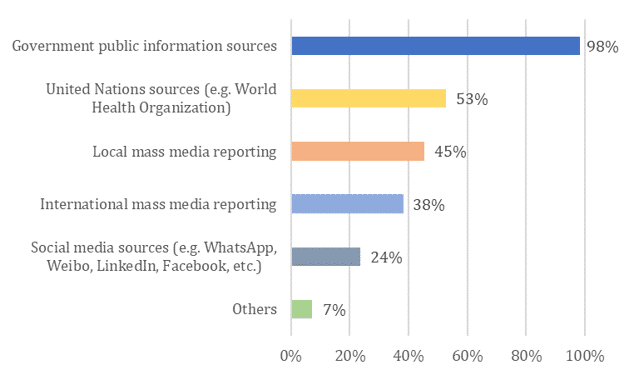
“In addition to following the Government requirements and the instructions from the Department of Education, Norwegian Universities have been cooperating with each other trying to ensure a common standard amongst Norwegian higher education institutions”
“Recommendations of some International organizations such as ICS, INTERTANKO, BIMCO were also taken into account”
